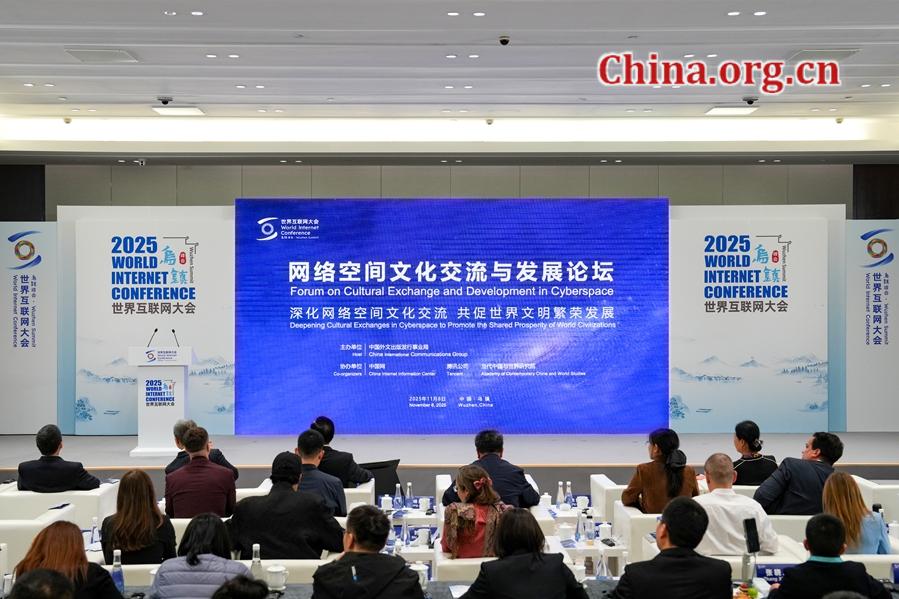Wuzhen summit forum explores cultural exchange, development in cyberspace

A forum on cultural exchange and development in cyberspace was held during the 2025 World Internet Conference (WIC) Wuzhen Summit in Wuzhen, Zhejiang province, on Nov. 8, bringing together officials and experts from China and abroad to explore ways to promote cultural development. [Photo by Zheng Wei/China.org.cn]
A forum on cultural exchange and development in cyberspace was held during the 2025 World Internet Conference (WIC) Wuzhen Summit in Wuzhen, Zhejiang province, on Nov. 8, bringing together officials and experts from China and abroad to explore ways to promote cultural development.
The forum was hosted by China International Communications Group (CICG) and co-organized by China.org.cn, Tencent and the Academy of Contemporary China and World Studies. Under the guidance of the Global Civilization Initiative, the Forum on Cultural Exchange and Development in Cyberspace invited government officials, heads of international organizations, renowned scholars, executives from internet enterprises, and opinion leaders from China and abroad to discuss the latest trends and achievements in cyberspace cultural development and to exchange experiences and ideas on its promotion.
Themed "Deepening Cultural Exchanges in Cyberspace to Promote the Shared Prosperity of World Civilizations," the forum aimed to build a bridge for dialogue among civilizations in cyberspace and inject new vitality into creating a more open and inclusive community with a shared future in cyberspace.
During the keynote session, David Ferguson, honorary chief English editor at Foreign Languages Press under CICG, suggested that those skilled in languages are often great storytellers -- the kind of talent China urgently needs. As AI reshapes the translation field, many traditional roles may disappear, leaving valuable professionals underutilized. Yet the internet offers new opportunities, merging China's hard power in science and engineering with its soft power in language and communication, creating broader channels and new spaces for these talents to thrive. He also proposed establishing a new professional field -- "new technology and international communication" -- to integrate China's hard and soft power and fully unleash their combined potential.
Li Wei, counselor of the State Council and deputy dean and professor of the School of New Media at Peking University, delivered a keynote speech at the event. "Culture is the soul of a civilization, and communication is the lifeline of a culture," she noted. "With the rise of the internet and new media, both the content and form of culture have undergone profound changes. Communication itself has made a qualitative leap. Online culture, in its own unique way, is finding a balance between inheritance and innovation, gradually becoming a new bridge connecting different civilizations."
Wang Jiang, president of the Chinese Academy of Cyberspace Studies, noted that a new wave of the information technology, represented by generative AI, is rapidly transforming the world. He expressed hope for shaping a new consensus for online cultural exchange and development by empowering culture through technology, building future-facing bridges through people-to-people connections with a strong focus on the younger generation, and expanding space for dialogue among civilizations through respect and inclusivity.
"As the internet becomes deeply integrated into every aspect of human life, cyberspace has emerged as a new platform for cultural diversity to flourish, a new arena for mutual learning among civilizations, and a new bridge connecting people emotionally across borders," Wang said.
Zhu Dianjun, editor-in-chief and vice president in public policy of Tencent, said a new wave of technological revolution led by artificial intelligence is profoundly reshaping the global development landscape. At the same time, it is bringing unprecedented opportunities for cultural inheritance, innovation, and dialogue among civilizations. "As an internet technology company, Tencent has always embraced the mission of'Tech for Good.' We are committed to using technology as a solid foundation and culture as a source of soft power to build a bridge in the digital space that connects the past, present and future," he said.
The forum also included a session where experts shared their insights into cultural exchange in cyberspace, highlighting rich practices and innovative models, drawing wisdom from real cases to explore feasible paths for dialogue and mutual learning among civilizations, and strengthening the foundation for deeper understanding and global consensus.
Among them, Hong Tao, assistant to the general manager of Zhonghua Book Company, shared how AI and ancient text data are being used to breathe new life into China's heritage, bringing the wisdom of millennia from old books into modern life.
Jia Yi, chairman and CEO of Crazy Maple Studio, shared how the short drama platform ReelShort, designed for global audiences, marks a new step in bringing Chinese stories to the world. He noted that using algorithms and content ecosystems to bridge cultural divides and inspire co-creation is vital to building an open and inclusive digital civilization. Meanwhile, Stuart Wiggin, video content creator and recipient of the Friendship Envoy Award at the Second Orchid Awards, discussed how authentic short video storytelling can break barriers, spark cross-cultural resonance and help build an empathetic online community.
Dong Yuhui, a former English tutor turned livestreamer and internet celebrity, drew on his experience of connecting with millions of viewers through cultural content to share how new media platforms can help promote and spread traditional culture. "The power of culture is immense and enduring -- it can move people, comfort them, and inspire them," he said. "Today, we stand at an unprecedented intersection: On one side is the long river of culture that has flowed for millennia, and on the other, the surging tide of digital innovation. Promoting the prosperity and development of world civilizations calls on every internet professional to showcase the value of creativity and innovation."
During the later roundtable session, participants including Chen Gang, professor and deputy dean of the School of Arts and Communication at Beijing Normal University; Kaligaeva Ekaterina, a Belarusian content creator and host; Nicki Johnson, an American designer dedicated to traditional Li brocade in Hainan province; and Varga Bonita, a Hungarian student at Capital Normal University, discussed diverse narratives and mutual learning among civilizations in international communication, sharing their personal experiences on how new media can bridge cultural divides.
The forum also launched three key outcomes: the "China & World" online communication platform's cultural exchange co-creation initiative, the "2025 Chinese Cultural Symbols International Communication Index (CSIC) Report" and a showcase of international communication cases under the "Online Chinese Festivals" program, providing new directions for online cultural communication.


